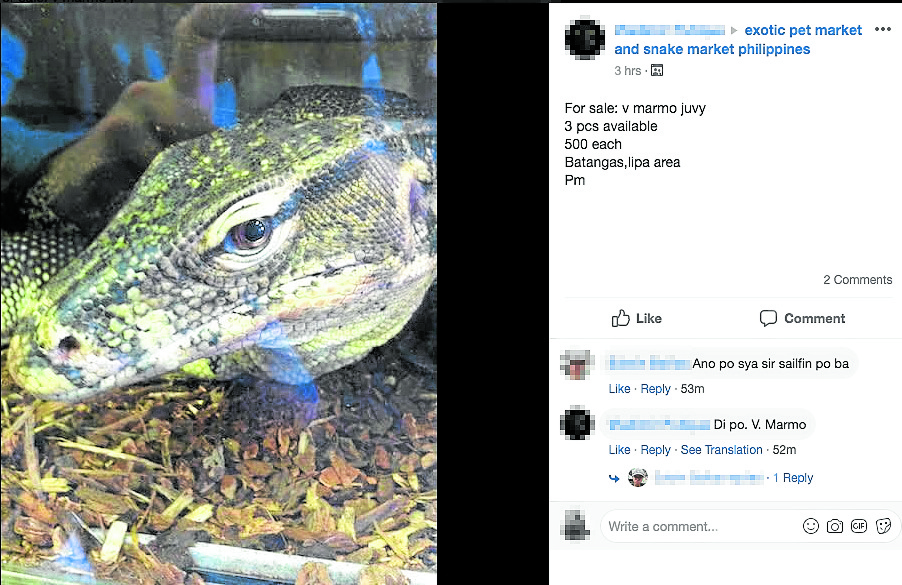Illegal ‘bayawak’ trade on Facebook goes unchecked

‘BAYAWAK’ ONLINE TRAFFICKING Traffic, an international wildlife monitoring network, recorded the rampant online trafficking of monitor lizards, commonly known in the Philippines as “bayawak.” It found more than 540 lizards advertised for sale in 20 Facebook groups during a 30-month monitor from 2017 to 2020. Screenshots courtesy of Traffic.
Social media has amplified the illegal trade of monitor lizards, commonly known in the Philippines as “bayawak,” as buyers and sellers evade regulations and enforcement on online platforms, according to a new study.
Traffic, an international wildlife monitoring network, reported the rampant trade of these large reptiles on Facebook, with more than 540 lizards advertised for sale during a 30-month monitor from 2017 to 2020.
The lizards, found in 20 different Facebook groups, were across 13 species, most of which were hatchlings or juvenile. Nearly two-thirds were endemic, or found only in the Philippines.
Researchers said the total market value of the offered lizards was P3.4 million. The most common and consistently available species to buyers was the marbled water monitor (Varanus marmoratus), which was being sold for up to P1,500, but could go as low as P400.
Role in ecosystem
“Monitor lizards play a crucial role in the ecosystem by regulating populations of various species, including those we consider as pests. They are also important food items for other species, such as the king cobra and the Philippine eagle,” Emerson Sy, the report’s lead author, said in an interview.
Article continues after this advertisement“If a population of monitor lizards is extirpated, it will disrupt the normal function of the ecosystem and may result in population growth of pests and emergence of diseases,” Sy said.
Article continues after this advertisementTraffic also documented one convicted wildlife trafficker that offered a Komodo dragon (Varanus komodoensis) for P850,000 in August 2018. This species is considered vulnerable and is protected by Indonesian law, suggesting that the lizard was smuggled into the country.
The Department of Environment and Natural Resources has not issued permits to collect and trade native wild reptiles for commercial purposes since 2001.
Poached
While the report was unable to establish whether all the lizards listed were wild-caught, Traffic said the sellers’ claims that the lizards were hunted, the low prices compared to the high cost of maintaining them and the few registered wildlife farms in the country suggested that the reptiles were poached.
Sy said that while illegal monitor lizard trade had persisted for decades, social media made it easier for traffickers to reach more buyers, both in the Philippines and in other countries.
“Although some social media platforms remove posts offering wildlife, if they violate use terms, much more must be done by enforcement agencies to crack down on those catching, selling and buying these animals,” he said.
Monitor lizards are traded for their skin for the leather industry and their meat for human consumption. Live animals also make for exotic and rare pets, with markets in the United States, Europe and Japan.
According to Sy, the most smuggled species is the yellow-headed water monitor lizard (Varanus cumingi), which is sought after for its attractive yellow colors and is endemic to Mindanao.
Legal trade?
Apart from the illegal online trade, researchers raised concerns over the laundering of wild-caught animals into the legal trade, either through dubious exports or under captive breeding operations.
Wildlife laundering is the process of fraudulently declaring illegal or wild-caught animals as bred in captivity.
Farms that claim to breed reptiles in captivity should undergo thorough checks and audits to ensure that they are not sneaking in wild animals into their programs, Sy said.
Researchers recommended greater vigilance at seaports and airports to prevent the smuggling of illegal wildlife within the Philippines and in other parts of the world.